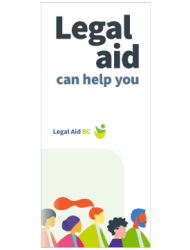If you’re a youth (under 18 years old) and you’re arrested, you have the same rights as an adult in BC. This includes the right to speak to a lawyer without delay after you’re arrested.
The police must:
- inform you of your right to speak to a lawyer, and
- allow you to speak to a lawyer at the first reasonable opportunity after your arrest.
How soon you can speak to a lawyer will depend on the circumstances of your arrest, including where you are when you’re arrested.
You also have rights under the Youth Criminal Justice Act (YCJA) that apply before the police can question you or get a statement from you as part of their investigation. You have the right to:
- speak to a parent, guardian, adult relative, or other appropriate adult that you choose before being questioned by or providing a statement to the police
- be given a reasonable opportunity for the lawyer and the adult you’ve contacted to be with you when you’re being questioned or making a statement
- be told in age-appropriate language that you have the right to speak to a lawyer and a parent or other adult before being questioned by or making a statement to the police
- be given a reasonable opportunity to contact a lawyer and the adult you’ve chosen to speak to if they can’t be reached immediately, and
- be told in age-appropriate language that any lawyer, and any parent or other adult you’ve spoken to after your arrest, must be with you when you’re being questioned or making a statement, unless you don’t want them to be with you
Speaking to a lawyer
If you have a lawyer or you know the name of a lawyer you want to speak to, you can ask to contact them. Or you can ask the police for a list of lawyers, or you can ask to speak to a free lawyer from Legal Aid BC.
A lawyer will be able to give you legal advice about your situation. They can:
- give you more information about your rights,
- help you understand your rights and how to use them, and
- explain your next steps.
Anything you say privately to the lawyer is confidential and can’t be used as evidence against you in court.
Speaking to the police
The police must:
- inform you of your rights, and
- make sure those rights are fulfilled,
before they can question you or try to get a statement from you, even after you’ve spoken to a lawyer. The police must tell you the reason for your arrest, and they’ll most likely ask you if you understand what you’re being arrested for. This isn’t the same as them asking if you committed the crime you’re being arrested for, or if you know the reason they’re arresting you for that crime.
You don’t have to:
- tell the police whether you agree or disagree with the reason for your arrest or whether you know why you’re being arrested,
- say anything about the crime being investigated, or
- answer any questions the police ask you as part of their investigation.
Anything you say to the police without being asked or encouraged, before they’ve had a chance to explain and act on your rights, can be used against you. Anything you decide to tell the police, after they’ve explained and acted on your rights, can be used against you. It’s a good idea to have a lawyer and a parent or other adult with you to help make sure your rights are protected.
Being questioned by the police
The police can’t question you if:
- you’ve asked to speak to a lawyer or a parent or other adult, but you haven’t had a chance to speak to them yet, or
- you’ve contacted a lawyer or a parent or other adult to ask for them to be present with you, but they aren’t with you yet.
The police may try to get a statement from you by asking you questions or by attempting to get you to talk about the crime they believe you committed. They may also want to ask you questions about other topics that will help them investigate you for that crime. You don’t have to say anything to the police at any time.
Making a statement to the police
A statement includes anything you say to the police. A statement isn’t limited to:
- a formal statement that’s recorded or written down,
- a confession or admission of guilt, or
- comments directly about the suspected crime.
Depending on the investigation, what you say to the police and the information you give them may be used as evidence against you in court or to help their investigation of you.
